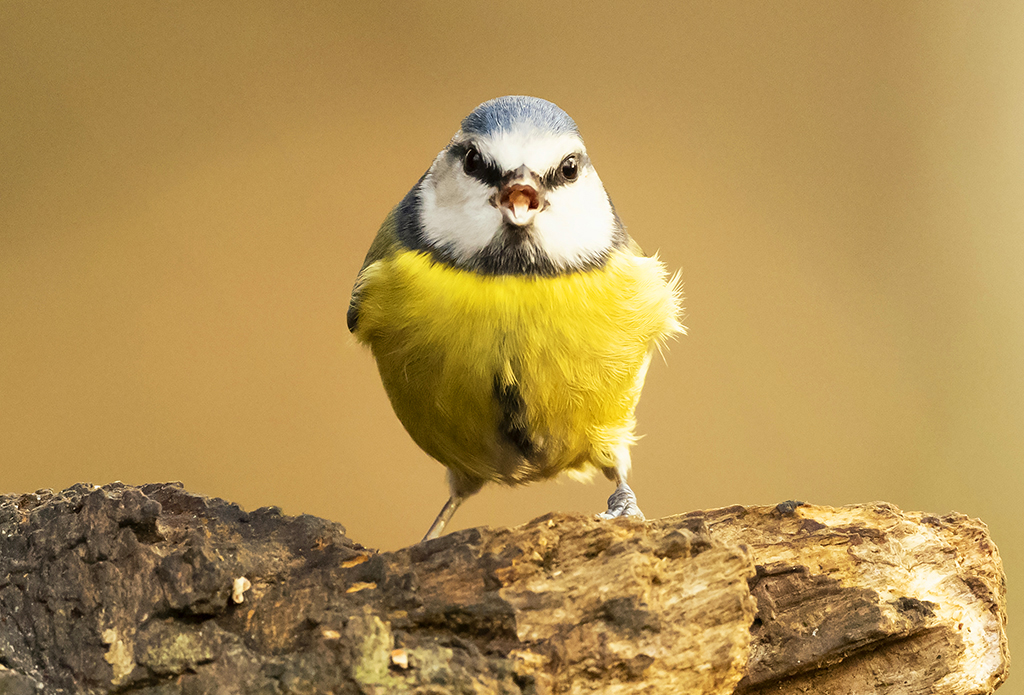New company bringing the birds and the bees to households nationwide
A new Irish company aims to raise happiness levels by introducing the birds and the bees to households across Ireland.
Studies have shown that using bird feeders and growing wildflowers increases people’s connection to nature, leading to feelings of wellness.
Using their combination of bird and wildflower expertise, Connecting To Nature will enable people to give a gift of wellness to loved ones by creating a bird feeding oasis and native flowers in spaces as small as an apartment balcony.

A new Irish company, Connecting To Nature, aims to raise happiness levels after studies have shown that using bird feeders and growing wildflowers increases people’s connection to nature, leading to feelings of wellness.Blue tit picture by Nick de Cent
The firm is the brainchild of Julie Power, whose Waterford-based family has been in the seed business for six generations.
“You don’t have to be in the countryside to connect with nature, all you have to do is create an environment that consistently attracts birds and bees,” said Ms Power.
“After lockdown, we now have a new awareness of the mental health benefits of connecting to nature, a renewed interest in our living world and improving our gardens for the benefit and love of wildlife.
“However, many people are unaware of the correct way to feed birds year-round and how they need different food at different times, or to successfully cultivate a wild garden.”
Studies have shown that greater bird biodiversity can make people more joyful.
“The World Economic Forum has published research that the happiest Europeans are those who see the most bird species in their day-to-day life,” said Patrick Croke, Technical Officer, Connecting to Nature.
“Being connected with nature is about feeling close to the wider natural world. Research shows that being connected with – rather than simply being exposed to – nature is more important for our mental wellbeing,” he said.
“Feeding birds is a very good way of feeling closer to nature and bringing wildlife closer to you, and Ireland has a wonderful array of small wild birds that you can feed.”
Connecting to Nature specialises in different types of food depending on the time of year, so that now, as we are heading into winter, Patrick recommends peanut and suet-based products, such as suet covered oat flakes.
“The birds’ diet changed in recent months from one that was predominately insects to eating more seeds and fruit as autumn arrived and our range reflected that at the time.
“However now we will soon enter the Hungry Gap, the most challenging time of year for birds when natural food sources are at their lowest.
“Berries, seeds and grains that were plentiful during the autumn and early winter have been depleted.
“New plants and insects will not begin to emerge until early spring, and the ground is often frozen which eliminates their access to worms, all of which means that until the middle of March, birds are at an increased threat of starvation.
“Our Hi-Energy No Mess mix is an essential foodstuff during these colder months. It contains both Peanuts and Peeled Sunflower seeds, which means that birds expend no energy removing the shells.
Julie’s great, great, great grandfather William Power opened his first nursery, florist, and seed merchant business in Waterford in 1859 and the Power family has operated a successful agricultural seed business since then.
She has already developed a huge following with the Blooming Native wildflower seeds business, which has been the inspiration for combining bird feed and flower seed.
“Sowing wildflower seeds provides a habitat for pollinators such as bees and butterflies, seeds for wild birds, supports biodiversity, and brings us joy,” said Ms Power.
“I have a passion for the environment and I saw this as an opportunity to share how wildflower seeds can play their part in biodiversity and reveal the joy of native wildflowers in our ecosystem.
“I also found that the demand for native wildflower seeds continues to outstrip their supply.
“We produce our seeds on our own sites in Faithlegg, Co Waterford, and our mixtures are curated to provide both food for wildlife and colour throughout the year.
“It is very easy to get this right, with a bit of instruction. Through our platforms we aim to educate people on how to very simply sow and cultivate the gardens that they want.”
See connectingtonature.ie for more details.